Click on images to enlarge

habit (Photo: Jackie Miles and Max Campbell)
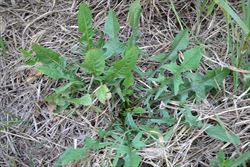
younger plants with deeply-lobed lower leaves (Photo: Sheldon Navie)
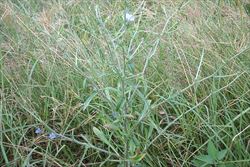
much-branched upper part of a plant (Photo: Sheldon Navie)
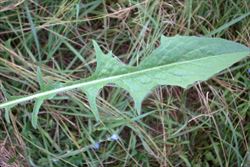
close-up of lower leaf (Photo: Sheldon Navie)

close-up of stems and leaf undersides with stiff hairs (Photo: Sheldon Navie)
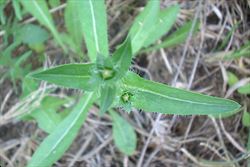
almost entire upper leaves (Photo: Sheldon Navie)

close-up of flower-head (Photo: Sheldon Navie)
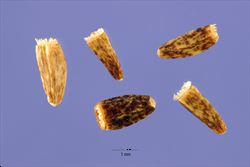
close-up of seeds (Photo: Steve Hurst at USDA PLANTS Database)
Scientific Name
Cichorium intybus L.
Family
Asteraceae (Queensland, New South Wales, the ACT, Victoria, Tasmania, Western Australia and the Northern Territory)Compositae (South Australia)
Common Names
Belgium endive, blue sailors, chicory, coffee chicory, French endive, succory, witloof
Origin
Native to Europe (i.e. Denmark, Sweden, UK, Austria, Belgium, Czechoslovakia, Germany, Hungary, the Netherlands, Poland, Switzerland, Albania, Bulgaria, Italy, Romania, Yugoslavia, France, Portugal and Spain), northern Africa (i.e. Algeria and Tunisia) and Asia (i.e. Afghanistan, Iran, Iraq, Lebanon, Syria, Turkey, Armenia, Azerbaijan, Georgia, southern Russia, Kazakhstan, Kyrgyzstan, Tajikistan, Turkmenistan, Uzbekistan, China, India and Pakistan).
Naturalised Distribution
This species is widely naturalised in Australia, particularly in the southern and eastern parts of the country. It is widely naturalised in Queensland, New South Wales, ACT, Victoria and Tasmania. It is also widespread in the southern regions of Western Australia and in the south-eastern and eastern parts of South Australia (including Kangaroo Island).
Notes
Though this species is primarily seen as a weed of agricultural areas (i.e. crops and pastures), roadsides and disturbed sites, it can spread from these habitats into disturbed native grasslands, rangelands and open woodlands. It is therefore occasionally regarded as an environmental weed in Victoria, South Australia, New South Wales, Tasmania and Western Australia. During a recent survey, chicory (Cichorium intybus) was listed as a priority environmental weed in at least one of Australia's Natural Resource Management regions.

